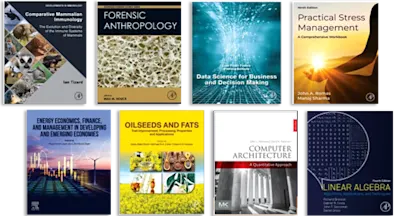
Advances in Sugarcane Biorefinery
Technologies, Commercialization, Policy Issues and Paradigm Shift for Bioethanol and By-Products
- 1st Edition - December 5, 2017
- Imprint: Elsevier
- Editors: Anuj K. Chandel, Marcos Henrique Luciano Silveira
- Language: English
- Paperback ISBN:9 7 8 - 0 - 1 2 - 8 0 4 5 3 4 - 3
- eBook ISBN:9 7 8 - 0 - 1 2 - 8 0 4 5 4 4 - 2
Advances in Sugarcane Biorefinery: Technologies, Commercialization, Policy Issues and Paradigm Shift for Bioethanol and By-Products, by Chandel and Silveira, compiles the bas… Read more
Purchase options

Advances in Sugarcane Biorefinery: Technologies, Commercialization, Policy Issues and Paradigm Shift for Bioethanol and By-Products, by Chandel and Silveira, compiles the basic and applied information covering cane and biomass processing for sugar and ethanol production, as well as by-products utilization for improving the economy of sugarcane biorefineries. In this unique collection of 14 chapters, specialists in their field provide critical insights into several topics, review the current research, and discuss future progress in this research area.
The book presents the most current advances in sugarcane biorefinery, including sugarcane crop cultivation, new sugarcane varieties, soil health, mechanization of crop, technical aspects of first and second generation ethanol production, economic analysis, life cycle assessment, biomass logistics and storage, co-generation of heat and electricity, process intensification and alternative by-products utilization. The book also explores the business ecosystem of sugarcane biorefineries, marketing analysis of ethanol demand and price dwindling patterns, aiming for a futuristic scenario. This book will be especially useful for scientists, researchers and technicians who are working in the area of biomass based biorefineries, as well as professionals in the sugar and alcohol industry. It also brings relevant content for policy makers, market analysts, agriculture scientists and managers.
- Presents technological updates on biomass processing, system biology, microbial fermentation, catalysis, regeneration and monitoring of renewable energy and recovery processes
- Includes topics on techno-economic analysis, life cycle assessment, sustainability, markets and policy
- Explores the future potential of biorefineries with zero or near zero waste, and the potential of valorization of all by-products, including alternatives to current applications and the management of a large amount of residues
Researchers and graduate students in the field of bioenergy, biomass exploitation and sugarcane crop study. Industry professionals interested in ethanol production from sugarcane. Energy planners, policy makers and analysts
- Edition: 1
- Published: December 5, 2017
- Imprint: Elsevier
- Language: English
AC
Anuj K. Chandel
Dr. Anuj K. Chandel is a Professor in the Department of Biotechnology, Engineering School of Lorena, University of São Paulo, Brazil. He has over 23 years of research experience working on process optimization and large-scale production of industrial enzymes and vaccine particles, biofuels, and membrane-based separation of fats, proteins, and viruses. He previously worked at the University of São Paulo, Brazil, the University of Stellenbosch, South Africa, and the University of Arkansas, Fayetteville, USA. He has also worked Dalas Biotech Ltd, Bhiwadi, Rajasthan; Celestial Biolabs Ltd, Hyderabad, and Centro de Tecnologia Canaviera-Piracicaba, Brazil, on large-scale production of industrial enzymes and cellulosic ethanol, for about 7 years. Dr. Chandel has published 125 articles in peer-reviewed journals and 56 book chapters, has edited 15 books, and holds one Brazilian patent. His primary research interests is to develop sustainable processes for bioconversion of lignocellulosic biomass into renewable fuels and biochemicals by bridging the gap between research laboratories and industries.
ML